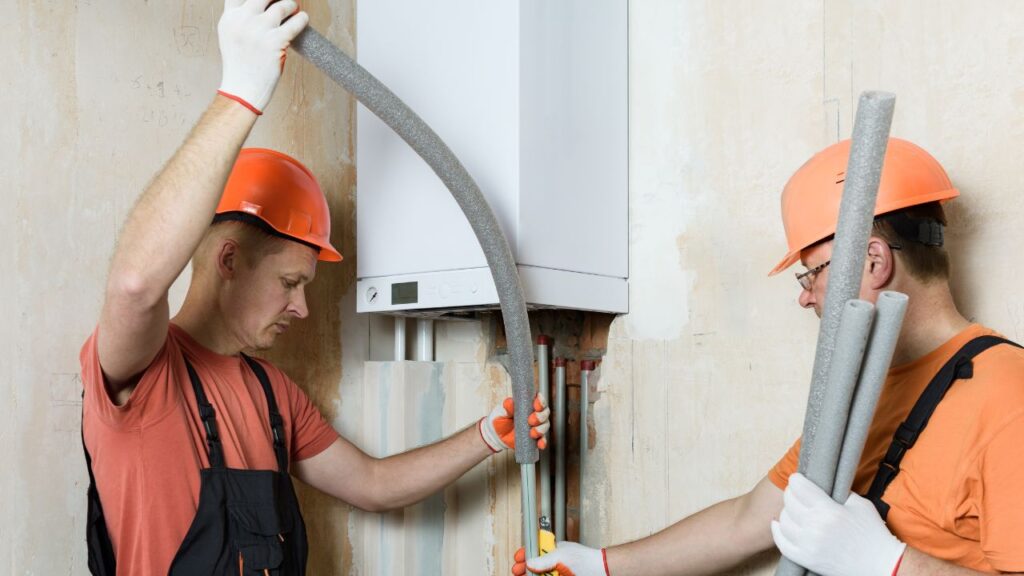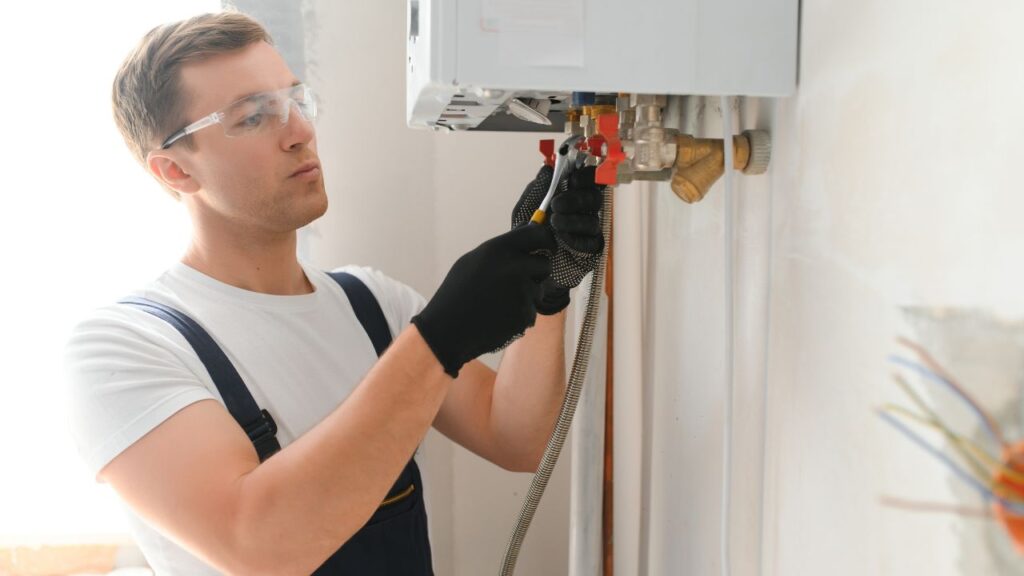Last Updated on November 14, 2025
The UK Government is implementing a ban on installing new gas boilers in buildings constructed from 2025 onwards. It is a step towards phasing out gas boilers, rather than an outright gas boiler ban.
In this article, we will look at why this ban is being put into place, how it will affect you if you own a gas boiler, and what will be replacing gas boilers. We will also examine the timeline for implementing this ban, what the overall government strategy is, and what challenges are on the horizon.
Contents
Why Is There A Gas Boiler Ban In 2025?

The UK Government is implementing a gas boiler ban in an attempt to transition the country away from its dependency on fossil fuels. The goal is to become carbon-neutral by 2050. Carbon neutrality means that for all the carbon dioxide the country emits, an equal amount will be offset through various strategies.
For example, let’s say the UK’s coal power stations put 100 tons of CO2 into the air each year. To offset this, the government will invest in 10 projects, each of which will reduce or remove 10 tons of CO2 emissions. Thus the CO2 the UK emits for the year will be a net zero amount.
Gas boilers produce a lot of CO2; a greenhouse gas responsible for climate change. It is estimated that the average gas boiler produces about 190 grams of CO2 per kilowatt-hour of energy used. That’s more than the 150 grams of CO2 emitted by a London bus driving one mile.
The UK has 23 million homes that use gas boilers, so it’s easy to see how the amount of CO2 very quickly adds up. In a 2021 study published in the Guardian, analysts found that the country’s gas boilers produce more than twice the CO2 of all UK gas power stations combined.
Let’s look at what the government is trying to achieve with its gas boiler ban in new buildings.
Reducing carbon dioxide emissions
The first goal of the gas boiler ban is to drastically cut greenhouse gas emissions. This will be achieved by gradually phasing out boilers that burn natural gas and fossil fuels. They will be replaced with heating systems that produce much less emissions; electric boilers, for example.
Driving innovation for a carbon-neutral UK
To reach the government’s overall goal of carbon neutrality by 2050, the heating industry will need to innovate and adapt. The ban on new gas boiler sales is seen as a driver for this needed innovation. It will push the industry to develop better green energy solutions.
As a direct result of this ban, we will see increased development of low-carbon technologies for heating. We will also see more widespread integration of renewable energy solutions.
As more products make it to market, there will also be a much higher awareness and acceptance of greener technologies. This will lead to even more people adopting low-carbon heating solutions.
We have already seen the impressive work the government has done in the last few decades in moving the UK off its coal dependency. The UK’s goals of carbon neutrality by 2050 are truly within reach.
How Does The Gas Boiler Ban Affect Me?
We have discussed why the ban is being put into place, so let’s discuss what exactly this means on a grassroots level for consumers.
No one in the UK will have to replace their working natural gas boilers when the gas boiler ban comes into effect.
Can I still replace my gas boiler after 2025?
You will still be able to replace any existing gas central heating solution you have in your home with a new gas boiler. The ban is only enforced on newly built homes, so any newly constructed buildings are banned from installing gas boilers.
However, with the ban in place, the heating industry will start phasing out the sale of gas boilers. This means that gas boilers will become more expensive to replace as they become more rare.
How will I maintain my gas boiler after 2025?
Maintaining your existing gas boiler will become much harder after 2025. Gas boiler parts will become less common and more expensive due to a lack of demand.
You will also see a shortage of skilled technicians who can maintain your gas boiler. More time and money will be invested in training engineers to maintain and install green heating solutions.
The sooner you invest in greener home heating solutions, the more money you will save over time. Gas boilers are cheaper to run and maintain right now, but over the next two decades, this will surely change.
The Timeline For Implementation
The UK Government’s plans to mitigate the effects of climate change started in 2008 with the Climate Change Act. This act was bolstered with further legislation in 2019 that introduced the idea of a Net Zero Emissions target. This legislation made the resolution legally binding for the UK to produce net zero emissions by 2050.
Let’s look at some of the problems that have made the government’s net zero goals hard to achieve.
Why has implementation taken so long?
The government has been in consultation with business interests and civil society to find the best path forward that will create achievable goals with tangible results. They need to consider political interests, international treaties, and current limitations on technology.
One of the biggest hurdles is the current energy infrastructure in place in the UK. What is the best way to integrate it with low-carbon heating systems? As mentioned earlier, with 23 million homes set up with natural gas infrastructure for their heating, this is no small task.
UK Government Strategy
The government has drafted an action plan to guide the UK’s move to net zero emissions. Let’s take a closer look at its broad goals.
The Heat and Buildings Strategy
The Heat and Buildings Strategy is a series of actionable measures and policies to help the UK reach carbon-neutral status by 2050.
It will tackle four problems:
- Reducing heating emissions: The first step is to ban the installation of gas boilers in new buildings. This will facilitate a gradual transition to low-carbon emissions heating solutions in UK homes.
- Increasing the energy efficiency of UK buildings: This is done through better insulation and heating systems with reduced greenhouse gas emissions. A building that achieves all these goals is known as “net zero ready”.
- Offering incentives and financial support to the public: The UK Government has a series of programs in place already, like the Boiler Upgrade Scheme, to help the public transition to green heating solutions.
- Training programmes to transition workers from the gas industry: The gas boiler ban will result in job losses. This is why part of the government strategy is to provide skills training for boiler technicians and Gas Safe engineers. Engineers will be ready to transition to a gas-free industry.
What Will Replace Gas Boilers
The UK has a host of excellent gas boiler alternatives available that do not directly make use of natural gas to generate heat.
Let’s take a quick look at three boilers that are touted as simple and relatively affordable low-carbon heating solutions after the gas boiler ban has taken effect.
Electric boilers
Electric boilers are one of the top candidates to replace gas boilers. They are highly efficient, easy to install, and they are very safe. They are also cheaper to maintain and they produce no emissions during use. They do have two downsides, though:
- While they do not burn gas while in operation, these boilers still need to use electricity. Currently, the UK uses both natural gas and coal to produce electricity. However, they are still much more eco-friendly than natural gas boilers.
- We are all familiar with the price of electricity in the UK. It is currently more expensive to run an electric boiler than a gas boiler.
Heat pumps
Heat pumps do not burn any material to produce heat. Instead, they work similarly to a refrigerator, extracting heat from one source and moving it to where it is needed. The heat can come from the air, the ground, or water.
Heat pumps are expensive to install and maintenance costs may be higher than a standard boiler but these costs will only reduce over time.
If you want a more in-depth look at heat pumps, you can read our article on heat pumps vs gas boilers.
Let’s take a quick look at two popular types of heat pumps.
Ground source heat pump (GSHP)
A series of looped pipes filled with water and antifreeze are placed underground. These pipes absorb the heat from the ground and move it up to a heat pump unit located in your home. By their very design, ground source heat pumps require enough space to install these ground loops. The initial installation cost will be high but they produce cheap, low-emission heat.
Air source heat pump (ASHP)
As they are very easy to install, air source heat pumps are a popular solution to replace gas boilers. They require more space than regular boilers and the unit itself is more complex than a standard gas boiler. Still, they already make up 10% of the world’s heating solutions.
These heat pumps are not recommended for areas with temperatures reaching below -10 ℃.
Biomass boilers
Biomass boilers burn wood and organic agricultural materials to heat water. They are a popular low-carbon heating solution and produce relatively low emissions compared to burning fossil fuels.
It is hard to determine the effect of these boilers on overall energy bills. Biomass boilers require more maintenance, and handling the fuel is much more labour-intensive compared to gas boilers.
It’s easier to connect a natural gas pipeline than to load up a boiler hopper with wood and other biomass.
Another proposed low-emissions heating solution is hydrogen boilers. However, the UK’s National Infrastructure Commission has stated that these boilers are not a suitable solution for the government’s net zero goals. Currently, government talks are still ongoing regarding the use of these boilers.

The Challenges Of A Ban On Gas Boilers
Let’s look at the hurdles faced by both consumers and businesses when it comes to the boiler ban.
Industry response
One of the biggest criticisms from the heating industry on the UK gas boiler ban is how impractical the government’s goals are. Considering the total scale of changes that need to be made to the UK’s current heating infrastructure, a 2025 ban on gas boilers seems too soon.
While some companies have started investing in research and development, many have asked the government for more clarity and guidance as to which technologies the industry should be focused on.
Impact on the public
People in the UK want an affordable home heating system that will reduce their energy bills. A gas boiler is still one of the most affordable ways the average person can heat their home. Transitioning from a natural gas boiler will require a big initial investment. We can also expect higher potential maintenance costs by consumers.
For example, as we have discussed above, heat pumps have technical challenges. This includes modifications needed for the heat pump to be integrated with current heating systems. So, should the public make an expensive investment in this solution, or would another type of low-emission boiler be more sensible?
The average person would not want to make a risky investment in a heat pump if another type of boiler is better.
FAQs
How much longer will gas boilers be around?
Realistically, if government plans go ahead, we can expect to see natural gas boilers being completely phased out after 2035. The ban on new gas boilers being installed in new homes starts in 2025. Currently, there are still ongoing talks about gas boilers being banned outright after 2035.
There is no part of the boiler ban that says your existing boiler must be replaced. The process of gas boilers being phased out will be gradual – we cannot reduce carbon emissions to net zero overnight.
What is the best gas boiler alternative?
Currently, electric boilers are the most versatile alternative to gas boilers. They can easily integrate with existing boiler infrastructure and they have no emissions during use. Regardless of future bans on boilers, electric boilers will remain a net zero boiler alternative for decades to come.
Heat pumps are also an excellent solution, but they are expensive to install and maintain. A ground source heat pump requires a large initial investment and air source heat pumps are limited in their use in cold climates.
Conclusion
The UK needs to move away from natural gas boilers and fossil fuel heating systems. The emissions caused by the widespread use of natural gas in almost every building’s heating system in the UK are incredibly high.
With new heating technologies like air source heat pumps, we see realistic replacements for our current gas heating systems.
Government strategies, like the Boiler Upgrade Scheme, make the transition to green energy more attainable, leaving no citizen behind.
When you are ready to upgrade your heating system, the best place to start is with us at Eco Happy. You can find the lowest prices on low-emissions boilers, installed by the most qualified local technicians in your area. Contact us for more information and assistance.





